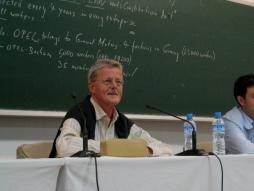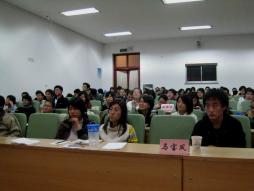On October 28, 2009, Mr. Wolfgang Schaumberg, a former member of the Works Council of the Opel Automobile GmbH (Opel), gave an academic lecture titled "Fighting for the Interests of Opel Employees" at the exchange meeting held at China University of Labor Relations (CULR) in Beijing Campus. The exchange meeting was hosted by Professor Zheng Qiao from the School of Labor Relations and Human Resources.
Wolfgang is a senior labor activist in Germany. After graduating from university, he worked at Opel for 30 years, serving as a member of the Works Council of Opel for 25 years. After retiring in 2000, he remained active in union activities in Germany and was dedicated to promoting exchanges between German and Chinese workers.
Wolfgang first briefly introduced the labor relations and union movement in Germany. These contents were written on the blackboard at the venue by Wolfgang in advance. Through Wolfgang's introduction, everyone quickly gained an understanding of the situation of the German Trade Union Confederation (DGB). The DGB includes eight industrial unions, with the largest union being the IG Metall, of which Opel is a member. The basic responsibility of the union is to safeguard the basic rights of workers by bargaining with the employer association every year and organizing worker strikes. Wolfgang also introduced the composition of Opel's works council, and the daily work of works council members, and explained in detail the relationship and differences between the union and the works council, for example, works council members are not allowed to participate in strikes, they represent the interests of workers while also considering the interests of the employer, and they are subject to special legal protection, etc. He also used his specific work as an example to vividly describe how works council members work hard to protect workers facing layoff threats. At last, Wolfgang recounted the 2004 strike in Germany - the Opel workers' strike. This strike, with the participation of works council members, has caused a sensation throughout Germany, with 11 consecutive shifts halting production, causing a huge impact on the European machinery manufacturing and automotive industries. Catalyzed by this strike, strikes in various industries subsequently swept across Europe.
The interactive session was the most exciting part for everyone. Students asked many questions about labor dispute resolution in Germany, labor relations operations, German unions during economic crises, and comparisons of the functions of German and Chinese unions. Wolfgang answered each question carefully and meticulously. Wolfgang's rigorous academic attitude and his contributions to friendly exchanges between German and Chinese workers won warm applause from all the teachers and students present. The two-hour exchange left everyone wanting more.
(Academic Affairs Office and School of Labor Relations and Human Resources)


